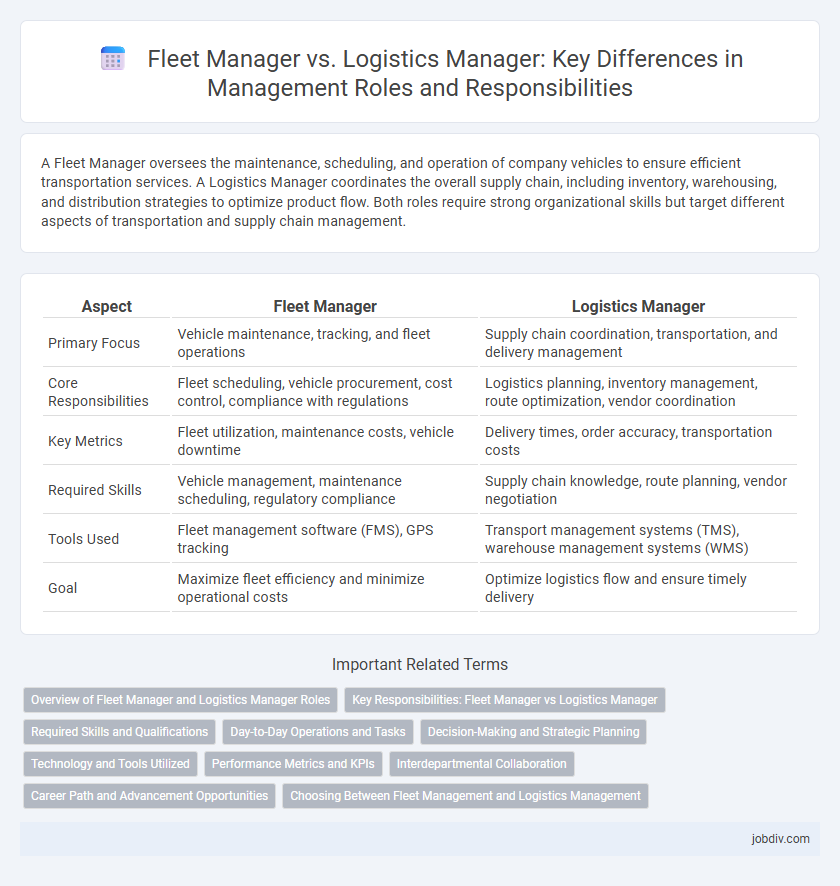A Fleet Manager oversees the maintenance, scheduling, and operation of company vehicles to ensure efficient transportation services. A Logistics Manager coordinates the overall supply chain, including inventory, warehousing, and distribution strategies to optimize product flow. Both roles require strong organizational skills but target different aspects of transportation and supply chain management.
Table of Comparison
| Aspect | Fleet Manager | Logistics Manager |
|---|---|---|
| Primary Focus | Vehicle maintenance, tracking, and fleet operations | Supply chain coordination, transportation, and delivery management |
| Core Responsibilities | Fleet scheduling, vehicle procurement, cost control, compliance with regulations | Logistics planning, inventory management, route optimization, vendor coordination |
| Key Metrics | Fleet utilization, maintenance costs, vehicle downtime | Delivery times, order accuracy, transportation costs |
| Required Skills | Vehicle management, maintenance scheduling, regulatory compliance | Supply chain knowledge, route planning, vendor negotiation |
| Tools Used | Fleet management software (FMS), GPS tracking | Transport management systems (TMS), warehouse management systems (WMS) |
| Goal | Maximize fleet efficiency and minimize operational costs | Optimize logistics flow and ensure timely delivery |
Overview of Fleet Manager and Logistics Manager Roles
Fleet Managers oversee vehicle maintenance, driver scheduling, and compliance to ensure efficient transportation operations within a company's fleet. Logistics Managers coordinate supply chain activities, including inventory management, distribution, and shipment optimization, to streamline product delivery processes. Both roles require strong organizational and analytical skills, but Fleet Managers focus primarily on vehicle assets while Logistics Managers manage broader supply chain networks.
Key Responsibilities: Fleet Manager vs Logistics Manager
Fleet Managers oversee vehicle acquisition, maintenance schedules, and compliance with transportation regulations to ensure operational efficiency and safety. Logistics Managers coordinate supply chain activities, including inventory management, route planning, and distribution strategies to optimize the delivery process and reduce costs. Both roles require strong leadership and problem-solving skills but emphasize different aspects of transportation and supply chain management.
Required Skills and Qualifications
Fleet Managers require strong expertise in vehicle maintenance, route planning, and regulatory compliance, along with proficiency in fleet management software and cost control. Logistics Managers need advanced skills in supply chain optimization, inventory management, and demand forecasting, coupled with knowledge of transportation regulations and excellent leadership abilities. Both roles demand strong analytical thinking, communication skills, and experience in data-driven decision-making to enhance operational efficiency.
Day-to-Day Operations and Tasks
A Fleet Manager oversees the maintenance, scheduling, and compliance of vehicles, ensuring optimal utilization and cost efficiency in transportation assets. A Logistics Manager coordinates the movement of goods, manages supply chain activities, and optimizes delivery schedules to meet customer demands and reduce transit times. Both roles require strong organizational skills, but Fleet Managers focus on asset performance while Logistics Managers emphasize overall distribution and inventory flow.
Decision-Making and Strategic Planning
Fleet managers focus on optimizing vehicle utilization, maintenance schedules, and operational costs to enhance day-to-day efficiency. Logistics managers prioritize end-to-end supply chain coordination, including inventory control, transportation routing, and demand forecasting for long-term growth. Strategic planning in fleet management revolves around asset lifecycle and compliance, while logistics managers emphasize market trends and distribution network expansion.
Technology and Tools Utilized
Fleet Managers leverage GPS tracking systems, telematics, and advanced vehicle maintenance software to optimize route efficiency and monitor fleet health in real-time. Logistics Managers utilize warehouse management systems (WMS), transportation management systems (TMS), and supply chain analytics platforms to coordinate inventory, shipping schedules, and delivery tracking. Both roles increasingly adopt AI-driven tools and automation technologies to enhance decision-making and operational efficiency across the supply chain.
Performance Metrics and KPIs
Fleet managers prioritize vehicle utilization rates, maintenance turnaround times, and fuel efficiency as key performance metrics to ensure operational reliability and cost control. Logistics managers focus on order fulfillment accuracy, delivery lead times, and transportation cost per unit to optimize supply chain efficiency and customer satisfaction. Both roles use KPIs such as on-time delivery rates and error reduction to measure success but differ in emphasis--with fleet managers targeting asset management and logistics managers targeting process optimization.
Interdepartmental Collaboration
Fleet Managers coordinate closely with Logistics Managers to optimize vehicle deployment and ensure timely delivery schedules. Effective interdepartmental collaboration enhances resource allocation, minimizes operational delays, and improves overall supply chain efficiency. Leveraging real-time data sharing and communication platforms facilitates synchronized planning between fleet maintenance, routing, and inventory management teams.
Career Path and Advancement Opportunities
Fleet Managers typically advance by gaining expertise in vehicle operations and maintenance, leading to roles such as Director of Fleet Services or Transportation Manager. Logistics Managers often progress by developing skills in supply chain optimization and strategic planning, enabling transitions into higher-level positions like Supply Chain Director or Operations Manager. Both career paths offer opportunities for specialization and leadership, but Logistics Managers usually have broader scope in global operations and multimodal transport management.
Choosing Between Fleet Management and Logistics Management
Choosing between fleet management and logistics management depends on the organization's core operational needs; fleet management emphasizes vehicle maintenance, route optimization, and compliance, ensuring efficient transportation assets. Logistics management encompasses broader supply chain coordination, including inventory control, warehousing, and distribution strategy, aiming for overall process efficiency. Companies prioritizing direct transportation oversight benefit from fleet managers, while those seeking end-to-end supply chain optimization should focus on logistics managers.
Fleet Manager vs Logistics Manager Infographic

 jobdiv.com
jobdiv.com